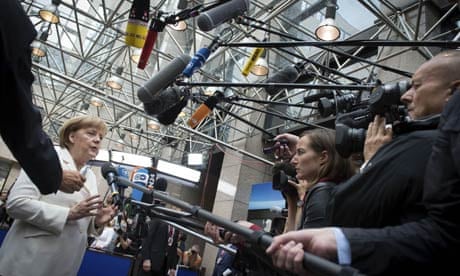In EU politics, lots of noes can sometimes produce a yes. That's what has happened again at the European summit this week. To recap: Spain wanted no toughened conditions for its public budget. Germany did not want to lend more without its debtors – and by implication all other eurozone members – surrendering budget authority. This time around, repeating the same old pledges to implement targets would not do. Italy didn't want to commit to further austerity, France is vague about federal budget authority (a subject on which Germany has exactly the opposite view) and, lest we forget, the UK wants nothing but a solution for the eurozone headache that will improve its own national prospects.
Amazingly, with the skill of a professional contortionist, the summit has delivered a compromise that everyone can just about live with. The downside is that the eurozone's future is now stuck inside the world's smallest and tightest suitcase. Namely, the solution to the crisis is dependent on a banking union, which is in itself still conditional on a banking supervision authority, which remains to be created.
But there is also an upside. The summit has set a target at the end of the year to create the banking supervision authority. At the December 2011 summit, Europeans had failed to set out a binding schedule for their next institutional steps: the market hardly gave them a three-month respite. This time, the market may grant a reprieve. It will figure that the endangered debtors – Spain, Ireland – can survive six months with the promise that the suitcase will be opened at the end of the year, and that Italy will be spared by contagion and will not have to fit in the suitcase.
Should the deadline be broken, however, it is more than likely that the market will asphyxiate everyone inside the suitcase. The first hurdle, therefore, is a legitimate and believable solution to the supervision issue by the end of the year. This will predictably be a Franco-German trench war. French banks have thrived on a dirigiste diet, while Germany will want to close the loophole of public borrowing from national banks.
But for the time being, all the noes have been rewarded. Spain isn't subjected to the kind of loss of financial control that Greece has gone through. Germany is conditioning its new support to a pledge for common supervising authority, although it would have preferred implementing the supervision before loosening the strings of the purse. France is getting the schedule it wanted – pledges of solidarity before more commitments to surrendering banking and fiscal authority. The UK can only watch the caravan go by, but it hasn't been asked for any specific commitment.
Have we therefore failed to move even one step towards federalism? Not so simple. In keeping with Europe's tradition of walking backwards towards more integration, federalism is not the goal there. It is merely the worst solution, except for all the others that have been tried.
Of course, that's not to say that plenty of obstacles still remain ahead. One shouldn't forget that François Hollande won't be able to hold off ratifying the December 2011 fiscal pact much longer. Angela Merkel will be politically squashed between her party and a strong opposition calling on her to continue on the path set out on Friday. Mariano Rajoy will, in the next six months, continue to pile on his official debt figures, which doesn't put him in a position to resist strong banking supervision. Mario Monti has no incentive to rock the boat, when the steps taken this week may save Italy from calling for help.
Yet the drift into federal solutions, however involuntary or reluctant, is likely to continue.
